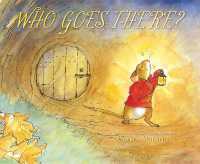- ホーム
- > 洋書
- > 英文書
- > Nature / Ecology
Full Description
This book presents an overview of different data collection methods and approaches that have been used to identify and analyse institutions associated with natural resource governance.
Institutions as rules of the game are fundamental to the management, governance and use of renewable natural resources, such as fisheries, forests and water. Yet researching institutions, particularly informal institutions, can be challenging as they can be difficult to identify, investigate and understand. This volume tackles this challenge head on. The innovative collection brings together contributions from different disciplines and traditions reporting and reflecting on a range of qualitative and quantitative research methods and experiences. The book begins by reviewing definitions and typologies of institutions and introduces different approaches to researching institutions in natural resource governance, namely the Bloomington School, associated with Elinor Ostrom, and Critical Institutionalism. Following this, each chapter provides an overview and example of application of research approaches and methods, including mixed methods, institutional grammar, fuzzy cognitive mapping, network analysis, assemblage and ethnography. The concluding chapter identifies key insights into institutions and lessons on researching institutions. From these, the chapter provides a set of observations on researching institutions in natural resource governance, with the aim of providing guidance for new and experienced researchers.
The volume provides an essential introduction for students and researchers into the range of methods and approaches, and their practical application, that can be used to research institutions associated with natural resource governance.
Contents
1. Theory and methods in the study of institutions (Fiona Nunan) 2. Using the Institutional Analysis and Development (IAD) Framework to link collective action, behavioural change and social-environmental outcomes in conservation policy (Tanya Hayes and Felipe Murtinho) 3. Applying the Institutional Grammar in the Study of Natural Resource Governance (Saba Siddiki and Edella Schlager) 4. Measuring institutions in quantitative field research (Graham Epstein) 5.Institutional Complexity in Linked Socio-Ecological Systems - An Approach to Studying Multi-Level, Cross-Scalar Contexts (Candace K. May) 6. Participatory modelling of institutional dynamics: Navigating epistemological challenges in fuzzy cognitive mapping (Jelto Makris, Michael Kriegl, Ben Nagel and Achim Schlüter) 7. Practical considerations for network analysis in research and decision-making: drawing from diverse approaches for grounded insights (Rebecca. A. Riggs, James. D. Langston and Mas Davino Sayaza) 8. Deconstructing Local Institutions in a Forest Landscape: An Ethnographic Case Study from India (Sumana Datta) 9. Staying with the trouble: Experimenting with a socio-technical approach to researching water governance (Tavengwa Chitata, Frances Cleaver and Jeltsje Kemerink-Seyoum) 10. From rules to practices: Assembling natural resource governance in the Peruvian Amazon (José Carlos Orihuela) 11. Navigating rules of 'the range' beyond the commons: Focusing on relationality and process in China and Kenya (Palden Tsering and Ryan R. Unks) 12. Conclusion (Fiona Nunan)








